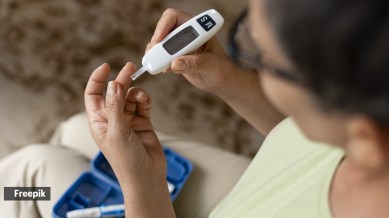📣 For more lifestyle news, click here to join our WhatsApp Channel and also follow us on Instagram
Is it true that eating vegetables before carbs can prevent sugar spikes by up to 75 per cent?
Food order, physical activity, sleep, stress management, and medication all work together to support overall well-being.

Many people with diabetes tend to worry about sudden blood sugar spikes after meals, but small lifestyle changes can make a big difference. So, we asked experts to share the best ways. “One very effective method is eating fibre-rich vegetables. The fibre coats the walls of the intestine, slowing down the absorption of sugars. This means when you eat carbs afterward, they don’t shoot into the bloodstream like a bullet, but instead enter more gradually,” said Dr Manjusha Agarwal, senior consultant, internal medicine, Gleneagles Hospital, Parel, Mumbai.
This is a simple dietary technique that can help people with diabetes and those at risk, as mentioned by Dr. Vijay Negalur, HOD, Diabetology, KIMS Hospitals, Thane.
Some social media posts claim that eating vegetables reduces the sugar spike by 75%. Is that true?
That number is an exaggeration, contended Dr Negalur. “Studies do show improvement, but the degree of benefit depends on many factors, such as the type of food eaten, portion size, cooking method, and individual response. In some people, the reduction may be significant; in others, it might be more modest. So while the benefit is real, stating a fixed percentage like 75 per cent is misleading,” said Dr Negalur.
What are other ways?
Likewise, adding protein or healthy fats, like nuts or eggs, to meals slows digestion and prevents sharp sugar spikes. “Even chewing food slowly makes a difference (provided there are no other distractions like phone and TV), because it allows the body more time to process the meal,” said Dr Agarwal.
Experts also suggest that drinking a glass of water before meals can slow digestion and help you feel full, so you may eat a bit less. “This indirectly helps reduce post-meal sugar spikes. But again, this is just a small tool, not a complete solution,” said Dr Negalur.
While food order does matter, it is not a quick fix, remarked Dr Negalur. “It works best when combined with other healthy habits such as portion control, balanced meals, and regular exercise. If you have diabetes, do not stop your medications just because you see better readings after changing your food order. Instead, continue monitoring your sugar levels and discuss changes with your doctor,” said Dr Negalur.
Moreover, not all carbohydrates are the same. “Whole grains and millets act very differently from refined carbohydrates like white rice or sweets,” said Dr Negalur.
People can also reduce their blood sugar levels by going for a short 10-minute walk after a meal. “Muscles use up some of the sugar in the blood, which brings levels down naturally, and it is possible to manage the blood sugar levels. Beyond this, reducing sugary drinks and replacing them with water or herbal tea also helps to control blood sugar levels,” said Dr Agarwal.
These are everyday practices that don’t require medicine but can support better sugar control when followed consistently.
Food order, physical activity, sleep, stress management, and medication all work together to support overall well-being. If you have diabetes, try eating vegetables first and observe your readings. Always keep your doctor informed before making any changes to your treatment, said Dr Agarwal.
DISCLAIMER: This article is based on information from the public domain and/or the experts we spoke to. Always consult your health practitioner before starting any routine.
📣 For more lifestyle news, click here to join our WhatsApp Channel and also follow us on Instagram